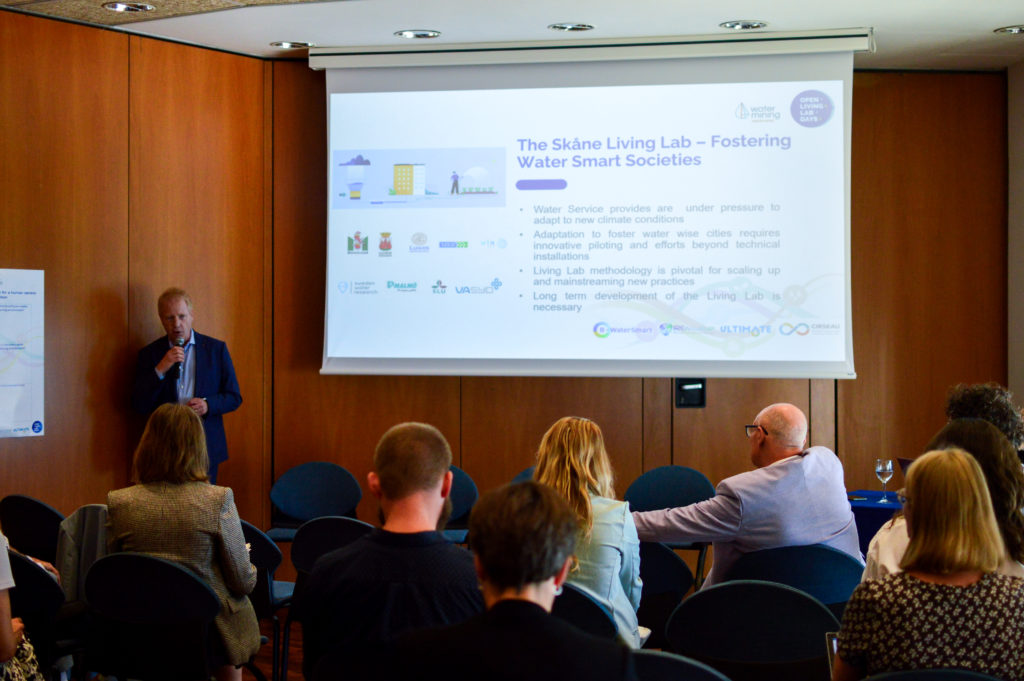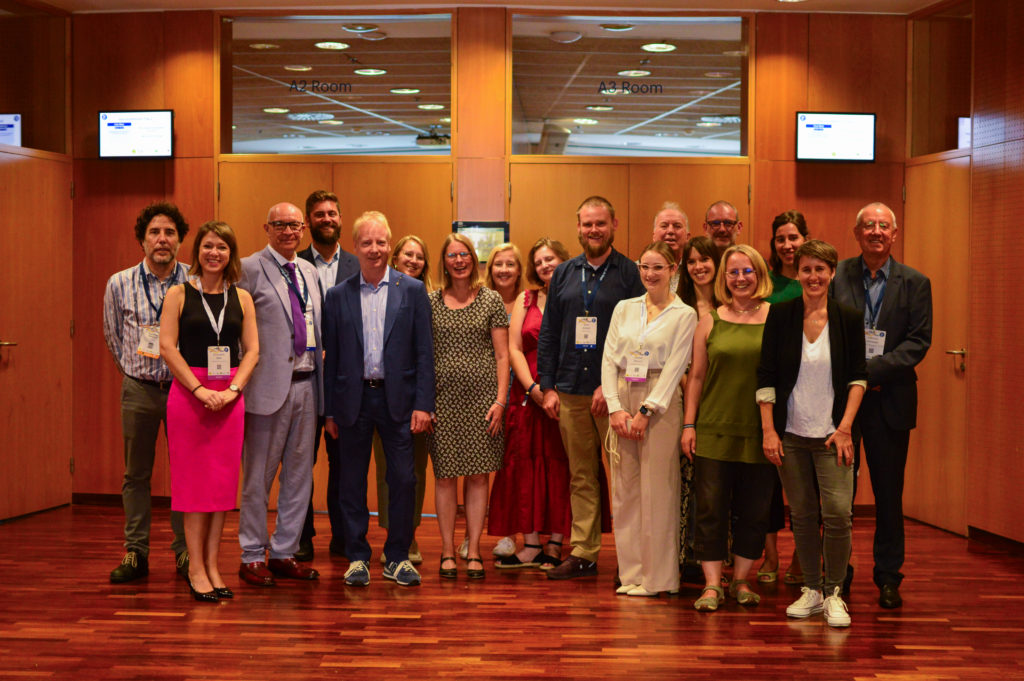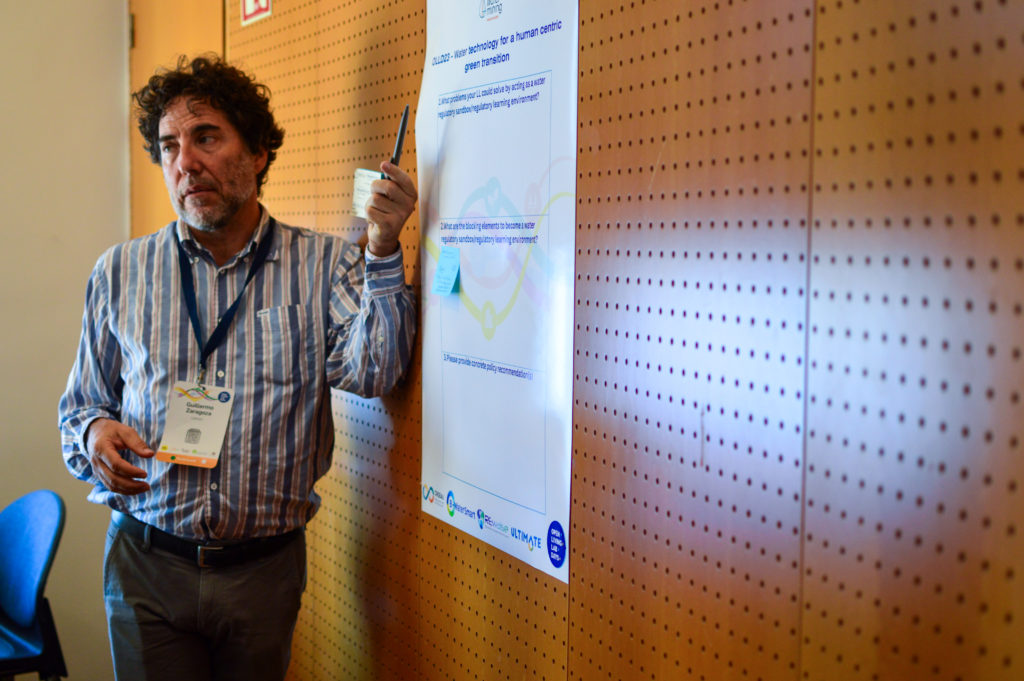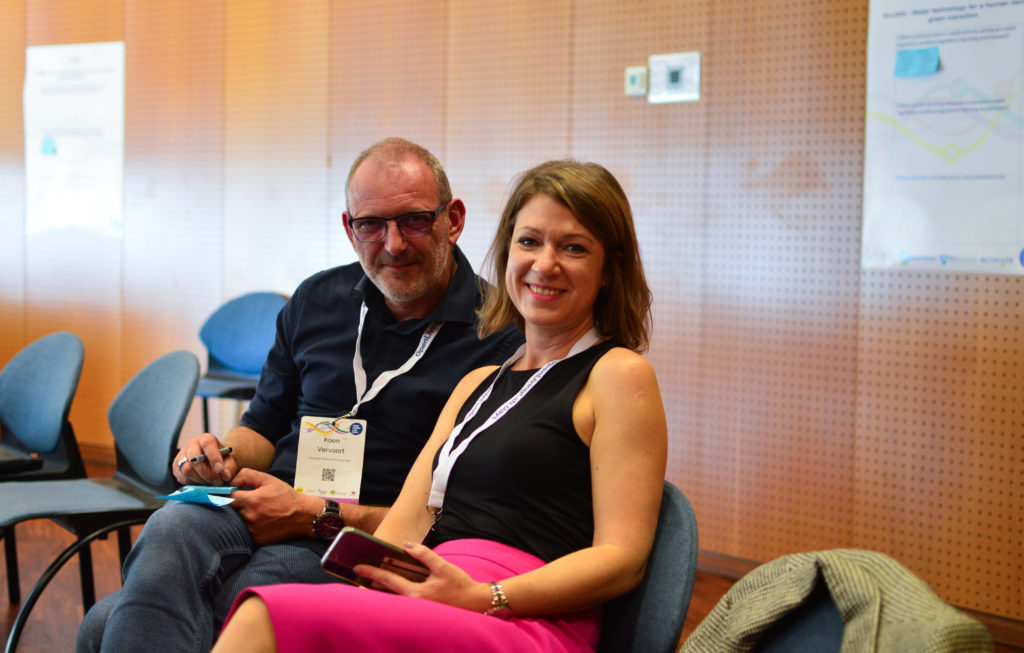09 Oct WATER-MINING at the OLLD 23 Barcelona, Spain
The WATER-MINING Project was presented at the OpenLivingLab Days 2023 (OLLD23) conference in the session “Water technology for a human-centric green transition” with a focus on “Sea-Mining and Regulatory Aspects” which took place at the World Trade Center Barcelona on Friday, on 22 September 2023.
Water technology experts, innovators, and regulators gathered in Barcelona to dive into the world of water-centric living labs. Hosted by WATER-MINING project partnerEuropean Network of Living Labs (ENoLL) in collaboration with the CIRSEAU cluster of water Living Labs, this event aimed to explore the intersection of experimentation spaces, public procurement, and regulatory frameworks in the context of water innovation.
 The Open Living Lab Days hosted by the European Network of Living Labs (ENoLL) served as a platform for knowledge exchange and collaboration among innovators, researchers, public officials, and industry leaders from around the world. The event aimed to raise awareness of the significant progress made by CIRSEAU cluster Living Labs, highlighting the vital role of sea-mining and water experimentation. It also marked the beginning of co-creating a water regulatory sandbox positioning paper.
The Open Living Lab Days hosted by the European Network of Living Labs (ENoLL) served as a platform for knowledge exchange and collaboration among innovators, researchers, public officials, and industry leaders from around the world. The event aimed to raise awareness of the significant progress made by CIRSEAU cluster Living Labs, highlighting the vital role of sea-mining and water experimentation. It also marked the beginning of co-creating a water regulatory sandbox positioning paper.
WoLL Pitches: Showcasing Water-Oriented Living Lab Projects
The event kicked off with a series of pitches from Water-Oriented Living Lab (WoLL) projects within the CIRSEAU cluster. These pitches aimed to raise awareness about technology readiness and citizen engagement in green transition initiatives.

The featured projects included:
WATER-MINING: Exploring sustainable solutions for mining seawater, a critical resource in regions with water scarcity issues.
Rewaise: Focusing on wastewater treatment and reuse for sustainable agriculture.
B-WaterSmart: Addressing the challenges of water usage efficiency in greenhouse agriculture.
Ultimate: Investigating industrial water utility symbiosis for a Water-Smart society.
The session allowed for audience interaction and engagement, shedding light on innovative approaches to water-related challenges.

Panel Discussion: WoLLs as Regulatory Sandboxes
The next segment dove into a panel discussion that explored the potential opportunities and challenges associated with treating Water-Oriented Living Labs (WoLLs) as regulatory sandboxes.
The panel featured the following speakers: Zsuzsanna Bódi, Senior Strategic Advisor and Innovation Officer at ENoLL (European Network of Living Labs); Koen Vervoort, Senior Stakeholder Strategist at ENoLL (European Network of Living Labs); Andrea Guerrini, Commissioner of ARERA; Andrea Rubini, Director of Operations WaterEurope; Beatriz Medina, Partner & Consultant at Water, Environment and Business for Development; Sven Schade, Scientific Project Leader at European Commission, Joint Research Centre; Riccardo Momoli, Business Development Officer at Circular Materials; Sandra Casas, PhD, Head of Water Technology Research Line at Water, Air and Soil Unit; Guillermo Zaragoza, PhD, Head of Solar Thermal Applications R&D unit of Plataforma Solar de Almería – CIEMAT; and Henrik Aspegren, CEO of Sweden Water Research.
 Legislative Challenges
Legislative Challenges
One major challenge discussed was the separation of water and energy in legislation. While renewable energy use is incentivised and supported, similar incentives are often missing for renewable water sources. This disparity raises questions about the environmental impact of using non-renewable water sources for agriculture and the need for legislation to encourage the use of renewable water sources like desalination with solar energy.
Circular Water Economy
The WATER-MINING Project is also exploring circular water economy concepts. They aim to integrate the circular liquid discharge approach to avoid brine discharge and extract valuable salts from wastewater. This approach not only promotes sustainability but also adds value to the recovered salts for agricultural use.
Challenges in Industrial Symbiosis
The discussion expanded to industrial symbiosis, where municipalities and industries collaborate to improve water resilience. Challenges such as cost savings and regulatory compliance were highlighted, with a focus on reusing reclaimed water for industrial purposes.
Efficiency through Renewable Energy
The role of renewable energy in water management efficiency was a recurring theme. It was noted that decentralised renewable energy systems, particularly in desalination, are essential for achieving sustainability goals.

Guillermo Zaragoza, PhD, Head of Solar Thermal Applications R&D unit of Plataforma Solar de Almería – CIEMAT. Photo: REVOLVE Team
Diverse Case Studies
The WATER-MINING Project is working on diverse case studies across Europe, addressing specific challenges in each location. These include using reclaimed water for the food industry, stormwater management, and decentralised energy solutions.
The WATER-MINING Project and its partners are determined to find innovative and sustainable solutions to water scarcity and environmental challenges. By integrating renewable energy, promoting a circular water economy, and fostering collaboration between municipalities and industries, researchers are making significant strides toward a more water-smart society.
Co-Creation Workshop: Shaping Water Regulatory Sandboxes
The final part of the event was a co-creation workshop that encouraged reflection and the generation of new ideas. Attendees, including the audience and participating projects, collaborated to develop input for a multi-stakeholder policy paper. This paper aims to initiate the advocacy process for WoLLs as regulatory sandboxes, emphasising the importance of these spaces in fostering innovation and sustainability.
Throughout the event, speakers and participants emphasised the intricate relationship between water and energy, the challenges of decentralised solutions, and the importance of aligning regulatory frameworks with the goals of green transition and sustainability.
 OpenLivingLab Days: Shaping a Sustainable Future
OpenLivingLab Days: Shaping a Sustainable Future
OLLD23 is part of OpenLivingLab Days, ENoLL’s flagship annual event. This year, it was co-organised by three prominent local living labs: CVC, i2Cat, and Fundación Épica La Fura dels Baus. The overarching theme of the event, “Living Labs for an Era of Transitions: How Human-Centric Innovation is Changing Our Lives,” spotlights the important role Living Labs can play in driving positive societal change.
The event encompassed various conference tracks, including Green Transition, Digital Transition, Social Transition, Just Transition, and Living Lab Transition: Methodologies and Impact. Each track focuses on different aspects of innovation and sustainability.
For more information about OpenLivingLab Days 2023 and the inspiring work of Living Labs worldwide, please visit openlivinglabdays.com.
